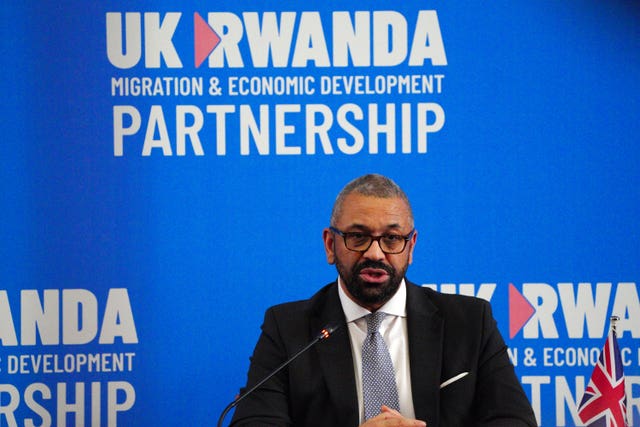
A total of £715 million was spent on the Rwanda deportation scheme, a cost breakdown of the plan has shown.
Among the costs outlined are £290 million paid to Rwanda’s government, £50 million on flights, escorting, airfield preparations and police force costs, and £95 million on detention and reception centres over a period between 2022 and June 2024.
Other spending, including on setting up new IT systems, legal costs, and staffing, added up to £280 million.
Home Secretary Yvette Cooper revealed the Government would publish the detailed costs of the plan to date as she made a statement in the House of Commons.
“In the two years the partnership was in place, just four volunteers were send to Rwanda at a cost of £700 million,” she told MPs.
She added: “That included £290 million paid to the government in Kigali and almost £300 million in staff, IT and legal costs.
“The result of that massive commitment of time and money was 84,000 crossed the Channel from the day the deal was signed to the day it was scrapped.
“This so-called deterrent did not result in a single deportation or stop a single boat crossing the Channel.”

Ministers scrapped the Rwanda scheme earlier this year when Labour came to power, and at the time estimated it had cost some £700 million.
At the time, the Home Secretary said scrapping the deal would “immediately” save £750 million, with some of the money invested into Labour’s new border security command.
Staff who had worked on the scheme have since been redeployed to immigration enforcement and returns.
Launched under the Tories in power, the Rwanda plan was designed deport migrants who had come to the UK after crossing the English Channel in a small boat to the landlocked east African country.
Its purpose was to deter further small boats crossings, but its opponents claimed there was a lack of evidence it would have this effect.
Conservative leader Kemi Badenoch has said an “effective deterrent for illegal migration” – such as the Rwanda plan – are among the ideas her party are considering as they set out a “new approach” on migration.


Why are you making commenting on The National only available to subscribers?
We know there are thousands of National readers who want to debate, argue and go back and forth in the comments section of our stories. We’ve got the most informed readers in Scotland, asking each other the big questions about the future of our country.
Unfortunately, though, these important debates are being spoiled by a vocal minority of trolls who aren’t really interested in the issues, try to derail the conversations, register under fake names, and post vile abuse.
So that’s why we’ve decided to make the ability to comment only available to our paying subscribers. That way, all the trolls who post abuse on our website will have to pay if they want to join the debate – and risk a permanent ban from the account that they subscribe with.
The conversation will go back to what it should be about – people who care passionately about the issues, but disagree constructively on what we should do about them. Let’s get that debate started!
Callum Baird, Editor of The National
Comments: Our rules
We want our comments to be a lively and valuable part of our community - a place where readers can debate and engage with the most important local issues. The ability to comment on our stories is a privilege, not a right, however, and that privilege may be withdrawn if it is abused or misused.
Please report any comments that break our rules.
Read the rules hereLast Updated:
Report this comment Cancel